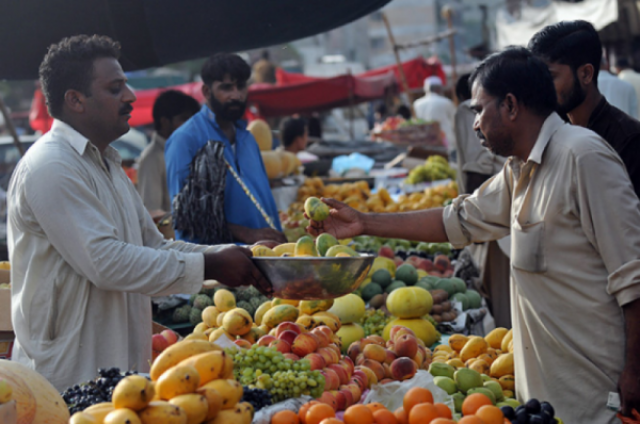LAHORE:
Trade disruptions along the Pakistan-Afghanistan border continue to affect prices of fruit imported from the neighboring country, while poultry rates have largely remained stable as exports from Pakistan remain suspended.
Although official vegetable price lists reflect a downward adjustment, consumers report little or no relief in actual market prices.
Vendors continue to overcharge despite government notices, while enforcement remains minimal, with authorities appearing more focused on photo ops for digital media than ensuring compliance on the ground.
Read: Punjab revises school timings as smog crisis worsens
This week, the price of live chicken was reduced to between Rs284 and Rs298 per kilogram — a drop of Rs5 — yet the product was not available at these prices in local markets. Similarly, chicken meat was officially priced at Rs432 per kilogram, down Rs7, but continued to be sold between Rs485 and Rs560 per kilogram.
Vegetable prices defy official lists
The price of potatoes rose by Rs5 per kilogram and though prices were fixed between Rs90 and Rs95, they continued to sell between Rs130 and Rs150. Sugar-free potatoes, listed at Rs60 to Rs65, were sold at Rs100 to Rs120, while sweet potatoes sold between Rs120 and Rs160 instead of the official Rs90 to Rs95.
Tomatoes fell by Rs20 on the official list to Rs150 and Rs165 per kilogram, but markets continued to price them between Rs300 and Rs350.
Local garlic fell by Rs10 to Rs190-Rs200 per kilogram, but was sold around Rs300. Harani garlic and the Chinese variety were also sold significantly above their fixed prices, at Rs400 and Rs600 respectively.
Also read: Pakistan reopens Afghan border as ceasefire holds
Thai ginger fell by Rs90, listed at Rs520 to Rs550 per kilogram, while Chinese ginger rose by Rs5, listed at Rs520 to Rs40 – but both varieties continued to sell between Rs700 and Rs800.
Spinach, lemon, pumpkin and ladyfinger also saw reductions on paper but remained buoyant in the markets.
Fruits see price increases
Fruits continued to register higher prices due to supply chain disruptions. Apple prices rose by Rs5 per kilogram and are now selling up to Rs600. Guava fell by Rs10 on the official list, to Rs225-Rs235, but was sold between Rs280 and Rs350.
Banana prices remained quoted at Rs135 to Rs150 per dozen but sold for up to Rs180 due to widespread overpricing.
Sharp increases were recorded in grapes, pomegranates and papaya. The Gola grape variety rose by Rs155 per kilogram to list at Rs567-Rs595, but was sold in the vicinity of Rs1,000. Kandhari and Danedar pomegranates fetched Rs160 per kilogram, sold between Rs600 and Rs1,000, while papaya was quoted at Rs255-Rs265 but sold between Rs350 and Rs500.
Meanwhile, the dates were priced at Rs 440 to Rs 515 per kilogram on the list, but retailed for up to Rs 2,000.
Read: Newborn ‘sold’ to Punjab restored; Karachi clinic sealed
Despite official claims of price controls, consumers continue to pay significantly higher prices, underscoring the widening gap between government announcements and reality.
“The prices are changing almost every other day and the customers are blaming us,” said vegetable vendor Rehman Butt. “When wholesale prices increase due to transportation costs or border issues, we have no choice but to increase prices as well.”
Sara Khan, a shopper in Model Town, said daily price lists have become meaningless. “You cannot find a single item sold at the official price – not even basic vegetables like onions or tomatoes,” she said.



